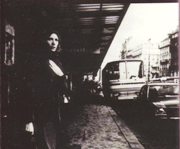Les Rendezvous d’Anna opens to a shot of an empty train station in an unspecified German city. In near silence, the passengers deboard a parked train and exit through the platform staircase, as a lone woman makes her way towards an empty telephone booth and stops to make a call. Moments later, she emerges from the telephone booth, presumably unable to contact the intended party, and proceeds down the staircase. The severe and rigorously framed scene is an introductory glimpse of the rootlessness and alienation of an independent minded filmmaker named Anne Silver (Aurore Clement) who has been traveling through an endless series of distant, impersonal cities in order to promote her latest film. Anne arrives at a hotel to a waiting message from her mother (Lea Massari) asking her to stop through Brussels for a long overdue visit, and seems surprised by her mother’s knowledge of her constantly evolving itinerary. Alone in the hotel room, she attempts to initiate an operator-assisted telephone call to Italy, only to be informed of a two-hour connection delay. In order to pass the time, she inspects the room, listens to the radio, and makes a reluctant call to an old family friend named Ida (Magali Noel), apologizing for her unavailability to visit. Later in the evening, she returns to the hotel room with a gentle, emotionally wounded man named Hans (Helmut Griem), but inevitably rejects him despite his sincerity and tenderness. The following day, on her way to Brussels to visit her mother, Anna encounters Ida while changing trains at a Cologne station. An unexpected train delay forces a tenuous reunion between the two women, as Ida implores Anna to reconcile with her son and marry, even as she recounts her own growing distance from her husband. Inevitably, as Anna passes through these anonymous stations, the pattern of emotional isolation and missed connection that would invariably define her transient existence emerges.
Chantal Akerman presents a deeply personal, challenging, and affecting portrait of alienation and artistic disconnection in Les Rendezvous d’Anna. Using repeated images of impermanence and isolation, Akerman depicts the role of the artist in society as an objective and dispassionate chronicler of life’s process. The constant movement of trains, indistinguishable hotel rooms, anonymous brief encounters, and prolonged absences from home and family reflect the profound loneliness and personal sacrifice that has consumed Anna’s existence in pursuit of creativity and artistic independence. Strangers, estranged friends, and even lovers attempt to briefly connect with Anna, only to find her withdrawn and unaffected by their attempts at emotional (if not physical) intimacy. In the end, Les Rendezvous d’Anna becomes a poignant and emotionally conflicted examination of the artist as a perpetual exile and distant spectator of humanity.
© Acquarello 2001. All rights reserved.
